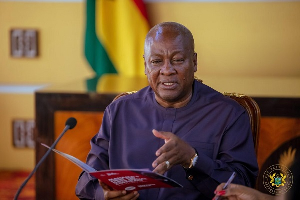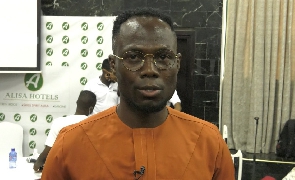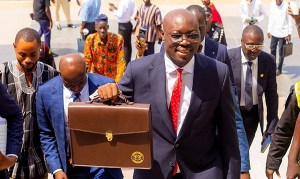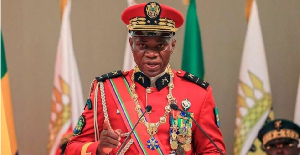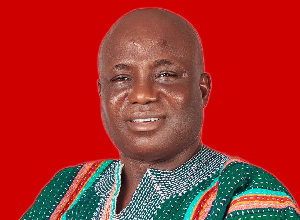According to Light and Keller (1975), Social structure is the orderly patterned ways that individuals or groups of people relate to each other in a society or one of its parts. The social structure of Ghana encompasses roles, statuses, social networks, social institutions, and groups. Social structure is not fixed and absolute, but emerges out of the process of interaction between and among people.
This relationship among people is characterized by social ordering. To ensure peace and order most times a definite pattern is created to foster this interaction. COVID 19 (Coronavirus) which is a large group of viruses that are common among animals. In rare cases, it is what scientists call zoonotic, meaning it can be transmitted from animals to humans. It can be spread when someone comes into contact with an infected person's cough and sneezes. On 16th March, President Nana Addo Danquah declared that schools be closed, banned social gatherings like church, festivals, political rallies when Ghana recorded two cases of COVID 19. These measures taken as a result of the COVID 19 have altered the social structure of Ghana in so many ways.
In Education, closure of schools nationwide has affected over 1.2 billion learners globally who are mainly children and youth. The Covid19 pandemic has changed the lives of large numbers of students, teachers and parents in Ghana, with millions now teaching and learning remotely from home.
The Coronavirus has distorted the academic calendar of schools which has brought about confusion and stress on the part of teachers and students. Although, there have been steps to continue learning for students even though schools are closed through online learning platforms and the rolling out of lessons broadcast on Ghana Learning Television (GLTV), many students do not have access to the internet especially those in remote areas.
Quality is a very important part of education service delivery that has become more difficult to ensure in this COVID 19 times. Many teachers in Ghana lack appropriate teacher training for distance and remote learning. As a result of this form of learning online, many teachers are not able to assess learner understanding of the topics being taught. Again, there is an increased vulnerability for female learners because they might face sexual violence and teenage pregnancy which are due to school closures.
In terms of socio-economic aspect, Ghana is an import driven economy and as a result of border closures, international trade has been disrupted. Disruption in the global supply chain with significant supply shortages and a slowdown in investments and remittances resulting in job losses.
There has been in decline in oil demand leading to a decrease in oil prices and a cut in revenue for oil-exporting countries like Ghana. Again, a decline in tourism and international travel, resulting in job losses. There has also been an unanticipated increase in health expenditure leading to additional borrowing and related expenses being incurred which increase the country's debt risk. On the individual level too, many people are incurring losses and slow businesses, for example restaurants and supermarkets are not having high patronage because of the fear of contracting COVID 19.
On the transport aspect also, drivers and car owners are not earning much due to social distancing being enforced in cars. Parents are also suffering to cater for the family because of children staying at home every day due to school closures. On the social aspect, social functions are not as they used to be because of COVID 19. Ghanaians like to dance and chat happily among themselves at functions but are restricted due to social distancing practiced at social functions like marriages and funerals. The number of people who usually attend these functions has reduced due to this pandemic.
In Religion, Ghana is a very religious country with the majority of the population being Christians. The COVID-19 pandemic has altered the program outline of many religious activities in various ways, including the cancellation of the worship services of various faiths, the closure of Sunday Schools, as well as the cancellation of pilgrimages surrounding observances and festivals. Many churches, synagogues, mosques, and temples have offered worship through livestream amidst the pandemic. Relief wings of religious organizations have dispatched disinfection supplies, powered air-purifying respirators, face shields, gloves, coronavirus nucleic acid detection reagents, ventilators, patient monitors, syringe pumps, infusion pumps, and food to affected areas. Other churches have offered free COVID-19 testing to the public. Although recently churches have been opened, one cannot easily forget the fact that most if not all Church offerings and collections have not been taken in the absence of Church services during the closure.
Outside the Christmas and New Year seasons, Easter is considered by many Ghanaian Churches as of their “cocoa seasons” owing to the large attendance of people at the various services and the “huge” offerings and collections that come with such attendance but this year many Christian's could not celebrate Easter due to COVID 19.
In the absence of congregations in the Churches and the taking of offerings and collections, the coronavirus has undoubtedly thrown most Church budgets out of the window, and even though a few Churches have tried to innovate ways to collect their offerings through the use of mobile money apps and other such platforms, the impact cannot be the same. Many Christians do not still attend church although church services have been opened due to fear and anxiety of contracting COVID 19. In the context of this fear and anxiety, Churches and their leaders can only hope and pray that their flock will not go missing in the post-corona virus period but will return to their fold safe, sound, and healthy.
In Political activities, Ghana has parliamentary elections on 7th December 2020. Elections are keenly contested here and campaigns are usually loud, chaotic, and, of course, crowd-centered. Preparations were on a tight schedule and did not leave much room for anything to go wrong. Then the virus struck and the first casualty was the National Identification Authority. It has not yet been able to finish giving identity cards to everybody above the age of 16. Without it, people cannot register to vote. The two main parties (NPP and NDC) are gauging each other as the nature of politicking has changed with the advent of coronavirus.
Political rallies have been put on hold and the political arrangements of the parties have changed due to COVID 19. Political campaigns cannot be as it has always been- crowd centered and loud. This year's election has put the citizens in a state of dilemma because of the introduction of the new register which many Ghanaians are afraid to go out and register because of the fear of contracting COVID 19. This year's election will likely experience a smaller number of voters due to the pandemic. Social distancing also being practiced effectively at registration centres is also debatable.
In Health, Ghana has been seriously impacted by the Covid-19 in our health systems. In Ghana, the Covid-19 pandemic has spurred people to adopt innovations in healthcare, from apps that help diagnose Covid-19 symptoms, to drones transporting blood samples to speed up the testing process. COVID -19 has unveiled the inequalities to access to healthcare in Ghana. Many areas in Ghana do not have enough hospitals and some don't have any at all. The testing facilities in Ghana are also small so samples have to be flown to Accra for testing. As a result of this, the President of Ghana has identified these problems due to the emergence of Covid-19 and has promised to build more hospitals and testing facilities. Ghana's doctors have also looked to technology to consult patients remotely. Many pregnant women are in fear of contracting COVID -19 and do not visit the hospital, this can increase the maternal and infant mortality in Ghana.
In the pharmaceutical retail space, Ghanaian start-up pharma, which last year acquired Kenya’s second-largest pharmaceutical chain, Hiltons, has been using technology to address inefficiencies in supply chains to lower drug prices. As Covid-19 began to cause global disruptions in drug supply chains, subsequently threatening the supply of important medicine in Ghana, in mid-March pharma launched a price control program called ‘Multi Keep My Price’. The initiative allows patients in need of chronic disease medication to continue paying the same price for their prescriptions for up to six months, regardless of market prices. Covid-19 has underscored the need to utilize technology for healthcare.
In a nutshell, the outbreak of the Covid-19 has some impacts on Ghana which include both positive and negative. Some positive include the need for Ghana to have more technological advancements in our education and health systems. But the negative overcome the positive because we rely on international trade, it has affected the economy and led to job losses. Also, social distancing has limited the freedom and activities of Ghanaians. The social structure of Ghana has gone through modifications due to Covid-19.
Benjamin Kwame Oduro
University of Cape Coast
Institute of Education
Bridget Asamoah
University of Cape Coast
Department of Population & Health
Opinions of Monday, 6 July 2020
Columnist: David Dzirasah, Contributor



